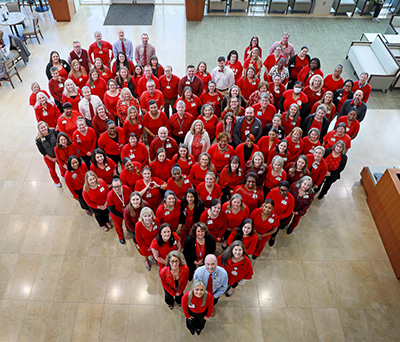Lexington Medical Center celebrates National Wear Red Day for American Heart Month
February 4, 2024Today, Lexington Medical Center staff wore red to help raise awareness about cardiovascular disease in honor of National Wear Red Day. National Wear Red Day is recognized annually on the first Friday in February during American Heart Month to bring greater attention to heart disease, which is the leading cause of death for Americans and the leading cause of death for women.
Heart disease is also the leading cause of death in South Carolina, that’s according to the S.C. Department of Health and Environmental Control. More than 11,300 people died from heart disease in South Carolina in 2020.
Here are five things that can be done to help minimize the risk of heart disease:
1. Eat Healthy
What you eat can affect your blood pressure and cholesterol level, lead to diabetes, and increase your weight — all of which burden your heart. Make sure you watch your trans-fat intake. Those are the processed fats you may get in fried foods, heavy cheeses, and baked goods. Pay attention to nutrition labels at the grocery store. Look for things that have zero or low trans fats to help lower your cholesterol. It’s the cholesterol — especially that bad cholesterol, the LDL — that sits in your sits in your coronary artery and carotid arteries and “clogs your pipes.”
2. Exercise
You can minimize your risk of heart disease or help treat existing heart disease through exercise. Exercise lowers your blood pressure and your heart rate. It also helps your brain release some endorphins, which makes you feel better in general. You don’t need to run a marathon or go to a workout class every day. Simply parking in the back of the parking lot, walking to your destination, or taking stairs instead of the elevator all add up. If you can’t exercise because of various orthopedic issues or age, you can exercise in your chair, even if it’s just moving your legs and getting your circulation going.
3. Quit Smoking
Smoking greatly increases your risk of heart disease. When you inhale smoke and nicotine, it irritates your arteries. And if your arteries are irritated, they’re more inflamed. Plaque wants to stick to those inflamed arteries, causing exactly what we don’t want — clogged arteries. Second-hand smoke is nearly as dangerous as smoking, so avoid being around it.
4. Sleep Well
It’s vital to get at least six hours of sleep at night. When your sleep is interrupted, your blood pressure and heart rate increase and you have less energy during the day. When you get good sleep, your body can rest, your blood pressure and your heart rate can rest — which means your heart can rest. Being rested helps you have more strength during the day to fight whatever stressors arise.
5. Manage Your Stress
Stress elevates your blood pressure and heart rate and that can affect your heart. Stress can also make you more likely to make bad choices in eating, leading to high cholesterol level and diabetes. Stress sometimes leads to drinking more alcohol than you should, which also leads to health issues down the road.
Even if you start small, try to do each of these five things every day. You will help to improve your existing heart disease or prevent heart disease from developing.
The Heart and Vascular Center at Lexington Medical Center is available if you or your loved one is concerned about your heart health. Visit lexmed.com/HVC to learn more.
About Lexington Medical Center
Lexington Medical Center is a 607-bed hospital in West Columbia, South Carolina. It anchors a health care network that includes six community medical centers and employs a staff of more than 7,800 health care professionals. The hospital was ranked best hospital in the Columbia Metro and #2 hospital in South Carolina by U.S. News & World Report and was named one of the “Best Places to Work in South Carolina” by SC Biz News, in partnership with the South Carolina Chamber of Commerce and Best Companies Group. Lexington Medical Cancer Center is an accredited Cancer Center of Excellence and has a clinical research and education affiliation with MUSC Hollings Cancer Center. The network includes a cardiovascular program recognized by the American College of Cardiology as South Carolina’s first HeartCARE Center. The network also has an occupational health center, the largest skilled nursing facility in the Carolinas, an Alzheimer’s care center and 70 physician practices. Lexington Medical Center operates one of the busiest Emergency departments in South Carolina, treating nearly 100,000 patients each year. The hospital delivers more than 4,000 babies each year and performs more than 25,000 surgeries.












